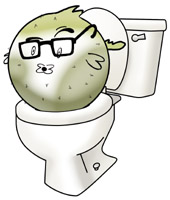Blowfish
Back to Contents of Issue: August 2003
|
|
|
|
by Leo Lewis |
|
|
But there is something extra amusing about the same thing happening in Japan, where schools spend a good chunk of their time forcing children to learn geographical facts by rote. Sure, when shown a map of Japan, a full 99.1 percent of 4th year primary school kids could identify Hokkaido because it's big and funny-shaped and sits at the very top of the map. But you'd think more than 63.3 percent would be able to pick out Tokyo.
One map that Blowfish would like to own -- and commit to his three-second memory -- would be a chart showing all the best restrooms in Japan. The closest anyone has come is Toyo Keizai -- the sophisticated economics magazine -- which has devoted itself to a survey of the nation's department stores and ranked them according to the frequency of toilet facilities. Most of them are pretty bad, but topping the list is the Daimaru located in Ashiya City, an affluent community in Hyogo prefecture, which boasts one restroom for every 390.9 square meters. Aside from Daimaru's single outlet, however, Seibu stores dominated, with six out of the nation's top 10 most toileted stores.
Clearly all those stores where you have to march around for hours before finding a toilet know their customers. And they have probably read another recent survey confirming that 94 percent of Japanese eat breakfast, but precious few opt for oatmeal. 38 percent go for a stodgy western affair, while a similar proportion consumes a classic rice-based Japanese meal. Despite the vast number of Japanese who claim to be on a diet, doughnuts, leftovers and sticky buns form the "most important meal of the day" for most of the remainder.
The supposed craze for dieting clearly hasn't affected the popularity of ice cream in Japan. Blowfish usually goes for wasabi flavor, but the rest of Japan has more of a sweet tooth. The nation's 10 most popular ice cream flavors according to a survey by the Japan Ice Cream Association were vanilla, chocolate, green tea, strawberry, rum raisin, soda, coffee, azuki (red bean), caramel and orange.
But it seems there are even more important flavors at stake in the lives of everyday Japanese. This is all rather puzzling for a blowfish who likes to get his gills around the natural taste of a fellow fugu. But you humans have to go that one step further. When the Harlequin Romance Report 2003 boldly asked Japanese women which flavor of kiss they liked the best, the not-so-coy responses included strawberry (14 percent), champagne (15 percent), peppermint (40) , vanilla (8), chocolate (6), and citrus (16)
The French have done a lot for world romance. Among other things, the French have also set an extraordinary precedent with their fascist rejection of non-French words. English speakers merrily accept words like decoltage, culottes and brassiere, but L'Academie Francaise has waged a 12-year war on English. Now, it seems, the Japanese are up for the same battle. The Ministry of Education is finally coming to the realization that if it doesn't hold the line on foreign imports, it soon won't have a language left to defend. The following English adoptions are the ones most likely to be expunged from everyday usage (their rightful Japanese equivalents are given in parentheses.): action program (jikkou keikaku), agenda (kentou kadai), analyst (bunseki-ka), commitment (kakuyaku), consensus (goui), harmonization (kyouchou), incubation (kigyou shien), outsourcing (gaibu itaku) and zero emissions (haishutsu zero). You get the idea: the rest of the list drones on for another 100 or so "unacceptable" foreign words.
The Japanese do, however, have a perfectly good word for "future," but that does not make anyone particularly happy about it. A majority of people surveyed by Infoplant looked ahead to a bleak economic wasteland, environmental and health threats and a disintergration of "peace of mind." You see what happens when you don't put enough lavatories in department stores?
|
|
Note: The function "email this page" is currently not supported for this page.


 Every so often Blowfish hears one of those breathless reports wherein a nation's youth is made to look stupid. A standard favorite is the simple test of asking children to point out something important on a blank map of the world, and then reveling in their failure. You know the sort: American kids often can't find Washington, and Brits have problems spotting Wales.
Every so often Blowfish hears one of those breathless reports wherein a nation's youth is made to look stupid. A standard favorite is the simple test of asking children to point out something important on a blank map of the world, and then reveling in their failure. You know the sort: American kids often can't find Washington, and Brits have problems spotting Wales.




